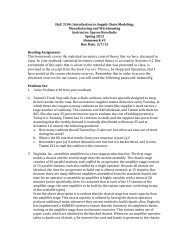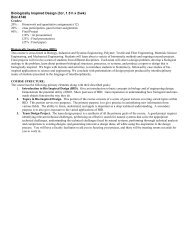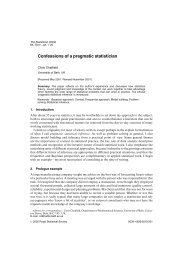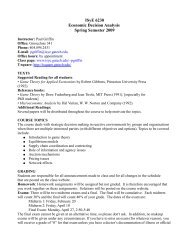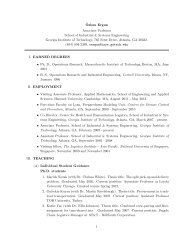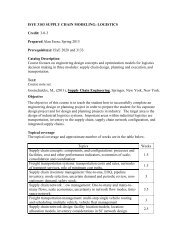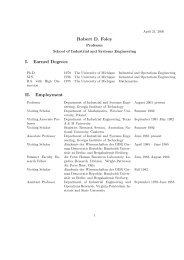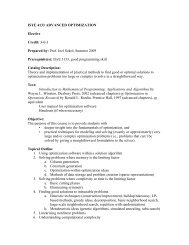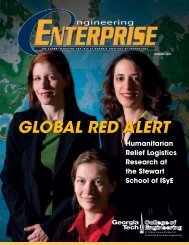Fall 2009 - H. Milton Stewart School of Industrial & Systems ...
Fall 2009 - H. Milton Stewart School of Industrial & Systems ...
Fall 2009 - H. Milton Stewart School of Industrial & Systems ...
Create successful ePaper yourself
Turn your PDF publications into a flip-book with our unique Google optimized e-Paper software.
ON THE MOVE<br />
Transportation Logistics at ISyE<br />
Christopher “Chris” L<strong>of</strong>gren (PhD IE 1986)<br />
is president and chief executive <strong>of</strong>ficer at<br />
Schneider National, Inc., a premier provider <strong>of</strong><br />
transportation and logistics services. He joined<br />
Schneider Logistics in 1994 as vice president<br />
<strong>of</strong> engineering and systems. He later served as<br />
chief information <strong>of</strong>ficer and chief operating<br />
<strong>of</strong>ficer before being named president and chief<br />
executive <strong>of</strong>ficer <strong>of</strong> Schneider National in 2002.<br />
In October <strong>2009</strong>, L<strong>of</strong>gren was inducted<br />
into the National Academy <strong>of</strong> Engineering. He<br />
currently serves on the Board <strong>of</strong> Directors <strong>of</strong><br />
CA, Inc., on the Advisory Boards <strong>of</strong> the <strong>Stewart</strong><br />
<strong>School</strong> and the College <strong>of</strong> Engineering at<br />
Georgia Tech, on the Executive Committee and<br />
the Board <strong>of</strong> Directors <strong>of</strong> the American Trucking<br />
Associations, Inc. (ATA), and on the Board<br />
<strong>of</strong> Directors <strong>of</strong> the American Transportation<br />
Research Institute, a research trust affiliated<br />
with the ATA. He previously served as a board<br />
member <strong>of</strong> the Green Bay (Wisconsin)<br />
Symphony Orchestra and the Green Bay Boys &<br />
Girls Club.<br />
Before joining Schneider National, L<strong>of</strong>gren<br />
held positions at Symantec Corporation,<br />
Motorola, and CAPS Logistics. He holds a<br />
bachelor’s and a master’s in industrial and<br />
management engineering from Montana State<br />
University and a doctorate in industrial and<br />
systems engineering from Georgia Tech.<br />
ISyE: What has been the most important technological<br />
innovation in your industry recently?<br />
CL: We had to develop new engine capabilities in response<br />
to the emissions requirements, and that’s been a pretty<br />
significant change and will continue to be one. We had to<br />
reduce emissions dramatically, and this really required<br />
a significant change in the design <strong>of</strong> the engine and the<br />
supporting components. I think we’re going to continue to<br />
face challenges here as we receive further requirements for<br />
emissions reduction, but the next hurdle hasn’t been placed<br />
out there in front <strong>of</strong> us yet.<br />
Technologically, I think it’s more about winning little<br />
battles. The tire manufacturers continue to work to<br />
achieve both longer wear and better miles per gallon (mpg)<br />
performance out <strong>of</strong> the tires. The tractor manufacturers<br />
continue to look for ways to figure out how to take out<br />
weight while adding strength, stability, wear resistance,<br />
and improved aerodynamics to the design. I think we’re at<br />
a place now where we’re not looking at big breakthroughs. I<br />
do think there is a lot <strong>of</strong> work being done today to figure out<br />
how to create technologies that promote safety. There are a<br />
whole series <strong>of</strong> things under investigation, such as looking at<br />
blinking patterns <strong>of</strong> eyeballs <strong>of</strong> drivers within the cab to try<br />
to identify fatigue.<br />
ISyE: Are there any other green or sustainable efforts<br />
besides the lowering <strong>of</strong> the emissions that are going<br />
on in your industry?<br />
CL: I think both the industry and our company have done<br />
a phenomenal job in terms <strong>of</strong> that. I’m a little bit jaded on<br />
some <strong>of</strong> this green stuff; I think in some cases it has been<br />
somewhat faddish for people who have chosen to do it. I<br />
think good companies in many different industries have<br />
done it because, number one, it’s the right thing, and number<br />
two, there are ways to do it such that it doesn’t come as a<br />
negative impact to your financials.<br />
For example, we’ve long had a policy <strong>of</strong> giving drivers<br />
bonuses for improving their mpg performance. So, don’t<br />
accelerate too fast. Don’t idle your tractor when you<br />
don’t have to because idling is the least fuel-efficient and<br />
the highest pollution cycle in the engine. We’ve made<br />
investments in a heat sync to allow the sleeper berth in the<br />
tractor to stay warm without requiring the use <strong>of</strong> the engine.<br />
Now, we’re trying to figure out a technology to do that on<br />
the cooling cycle because you always want to ensure that a<br />
driver receives good rest.<br />
In some cases, I don’t think the industry has gotten<br />
the credit it deserves. After you add these technologies<br />
to the tractor, you face a higher cost for which you then<br />
have to pay a higher federal excise tax, and you lose some<br />
payload because it adds weight to the tractor. I’ve always<br />
been <strong>of</strong> the mindset that this ought to be an industry in<br />
which the government looks to incentivize and encourage,<br />
rather than to regulate and tax. A lot <strong>of</strong> things happen not<br />
because somebody made the industry do them but because<br />
the industry was committed to doing the right things. We<br />
as a company have been committed to doing the right<br />
thing, but how do you get credit for it? It’s the “carrot and<br />
stick” dilemma in some regards. I think it would be more<br />
interesting if we spent more time thinking about how to<br />
create more carrots rather than grabbing another stick.<br />
ISyE: You are, and have been, a strong supporter <strong>of</strong><br />
the <strong>Stewart</strong> <strong>School</strong>. You have supported the <strong>School</strong><br />
in a variety <strong>of</strong> capacities, including being the chair <strong>of</strong><br />
the <strong>School</strong>’s Advisory Board. What do you find most<br />
rewarding about your work with Georgia Tech?<br />
CL: Well first <strong>of</strong>f, Georgia Tech has been very good to<br />
me. Clearly, the wonderful opportunity to be there and<br />
to learn there has been very instrumental in the kinds <strong>of</strong><br />
opportunities I ended up having in my career. I continue<br />
to grow more grateful for all that I’ve been able to have<br />
because <strong>of</strong> my experience at Tech. It is a special place. It is a<br />
place that combines the highest standards in academics and<br />
research, but it does so with a spirit that is incredibly human.<br />
I think the warmth <strong>of</strong> its people and the aspects <strong>of</strong> the heart<br />
and the mind are what make Tech unique. We may have<br />
some strong competitors in terms <strong>of</strong> training people with<br />
the mind, but the students and faculty members who have<br />
the opportunity to be a part <strong>of</strong> Georgia Tech also become<br />
enriched in the heart. And that enriching <strong>of</strong> the heart is just<br />
as important as the enriching <strong>of</strong> the head.<br />
The Alumni Magazine for the <strong>Stewart</strong> <strong>School</strong> <strong>of</strong> ISyE <strong>Fall</strong> <strong>2009</strong> • 9



